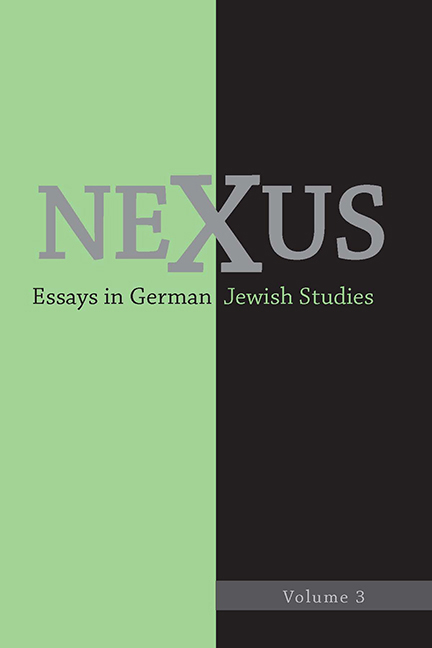Book contents
- Frontmatter
- Dedication
- Contents
- Acknowledgements
- Introduction
- “Ein weites Feld”: Ein Wort zu deutsch-jüdischen Studien anläβlich der Verleihung des ersten Egon Schwarz Prize for the Best Essay in German Jewish Studies
- “An Open Field”: A Word about German Jewish Studies on the Occasion of the Presentation of the first Egon Schwarz Prize for the Best Essay in German Jewish Studies
- Laudatio for Abigail Gillman's Prize-Winning Nexus Essay: “Martin Buber's Message to Postwar Germany”
- Heinrich Heine in Modern German History, by an Eyewitness
- Jeffrey Sammons, Heine, and Me: Some Autobiographical Reflections
- Heine's Disparate Legacies: A Response to Jeffrey Sammons
- My Debt to Heine and Sammons
- Die letzten Tage der Menschheit as a German-Jewish Tragicomedy, and the Challenge to Translators
- Edward Timms's “Die letzten Tage der Menschheit as a German-Jewish Tragicomedy and the Challenge to Translators”: A Response
- Kraus the Mouse? Kafka's Late Reading of Die Fackel and the Vagaries of Literary History
- The Parable of the Rings: Sigmund Freud Reads Lessing
- The Poetics of the Polis: Remarks on the Latency of the Literary in Hannah Arendt's Concept of Public Space
- The Marrano in Modernity: The Case of Karl Gutzkow
- German Jews Dogged by Destiny: Werewolves and Other Were-Canids in the Works of Heinrich Heine and Curt Siodmak
- Authenticity, Distance, and the East German Volksstück: Yiddish in Thomas Christoph Harlan's Ich Selbst und Kein Engel
Kraus the Mouse? Kafka's Late Reading of Die Fackel and the Vagaries of Literary History
Published online by Cambridge University Press: 11 May 2017
- Frontmatter
- Dedication
- Contents
- Acknowledgements
- Introduction
- “Ein weites Feld”: Ein Wort zu deutsch-jüdischen Studien anläβlich der Verleihung des ersten Egon Schwarz Prize for the Best Essay in German Jewish Studies
- “An Open Field”: A Word about German Jewish Studies on the Occasion of the Presentation of the first Egon Schwarz Prize for the Best Essay in German Jewish Studies
- Laudatio for Abigail Gillman's Prize-Winning Nexus Essay: “Martin Buber's Message to Postwar Germany”
- Heinrich Heine in Modern German History, by an Eyewitness
- Jeffrey Sammons, Heine, and Me: Some Autobiographical Reflections
- Heine's Disparate Legacies: A Response to Jeffrey Sammons
- My Debt to Heine and Sammons
- Die letzten Tage der Menschheit as a German-Jewish Tragicomedy, and the Challenge to Translators
- Edward Timms's “Die letzten Tage der Menschheit as a German-Jewish Tragicomedy and the Challenge to Translators”: A Response
- Kraus the Mouse? Kafka's Late Reading of Die Fackel and the Vagaries of Literary History
- The Parable of the Rings: Sigmund Freud Reads Lessing
- The Poetics of the Polis: Remarks on the Latency of the Literary in Hannah Arendt's Concept of Public Space
- The Marrano in Modernity: The Case of Karl Gutzkow
- German Jews Dogged by Destiny: Werewolves and Other Were-Canids in the Works of Heinrich Heine and Curt Siodmak
- Authenticity, Distance, and the East German Volksstück: Yiddish in Thomas Christoph Harlan's Ich Selbst und Kein Engel
Summary
Scholars have tended to minimize or ignore entirely the impact of Kafka's encounter with the work and person of Karl Kraus. While Kafka seems to have regarded with skepticism the satirist's famous public recitations, which he experienced firsthand as early as 1911, there is evidence that he followed Kraus's publications, especially his critical journal The Torch, with great, occasionally even passionate interest. Beginning with particulars from the epistolary exchanges with Max Brod and Robert Klopstock between 1921 and 1924, this essay examines Kafka's implicit response to Kraus in Josephine the Singer, Or The Mouse Folk and in other short fiction. Taking this interaction seriously promises not only new light on an important, repressed connection in the smaller world of German-Jewish literature; it also encourages a more macrocosmic view of the sometimes marginalized Austrian dimensions of German literary history.
Weren't the audiences to whom Kraus read reminiscent of the concerts that Franz Kafka's mouse Josephine gives for her people?
—Heinz Politzer, “Karl Kraus. Towards a Religious Interpretation” (1937)IMAGINE KARL KRAUS, initially, not as a mouse, which seems irreverent enough, but rather as a different symbolic species, as the missing link in the ongoing process of situating the seemingly indeterminable figure of Franz Kafka in the literatures of the German-speaking world in the twentieth century. Demonstrating the intermittent, but intense impact of Kraus and his satirical journal Die Fackel (The Torch) on Kafka's work would open up new perspectives on three intersecting aspects of literary history. First of all, the consequences of Kafka's late reading of Kraus would have to be written back into the intellectual biography from which Max Brod effectively erased it. Second, the “Jewish Kafka,” certainly one of the dominant scholarly concerns of the last three decades, could no longer be seen primarily in terms of the author's enthusiasm for the Yiddish theater, for example, or his ambivalent stance towards Zionism. It would also be necessary to assess more carefully the ways in which Kafka responded to German-Jewish and Austrian-Jewish writers and to the sometimes radically different discourses on Judaism in their work. Finally, Kafka's response to Kraus would have to be seen within the still relatively neglected context of a specifically Austrian literary history.
- Type
- Chapter
- Information
- Nexus 3Essays in German Jewish Studies, pp. 71 - 96Publisher: Boydell & BrewerPrint publication year: 2017

